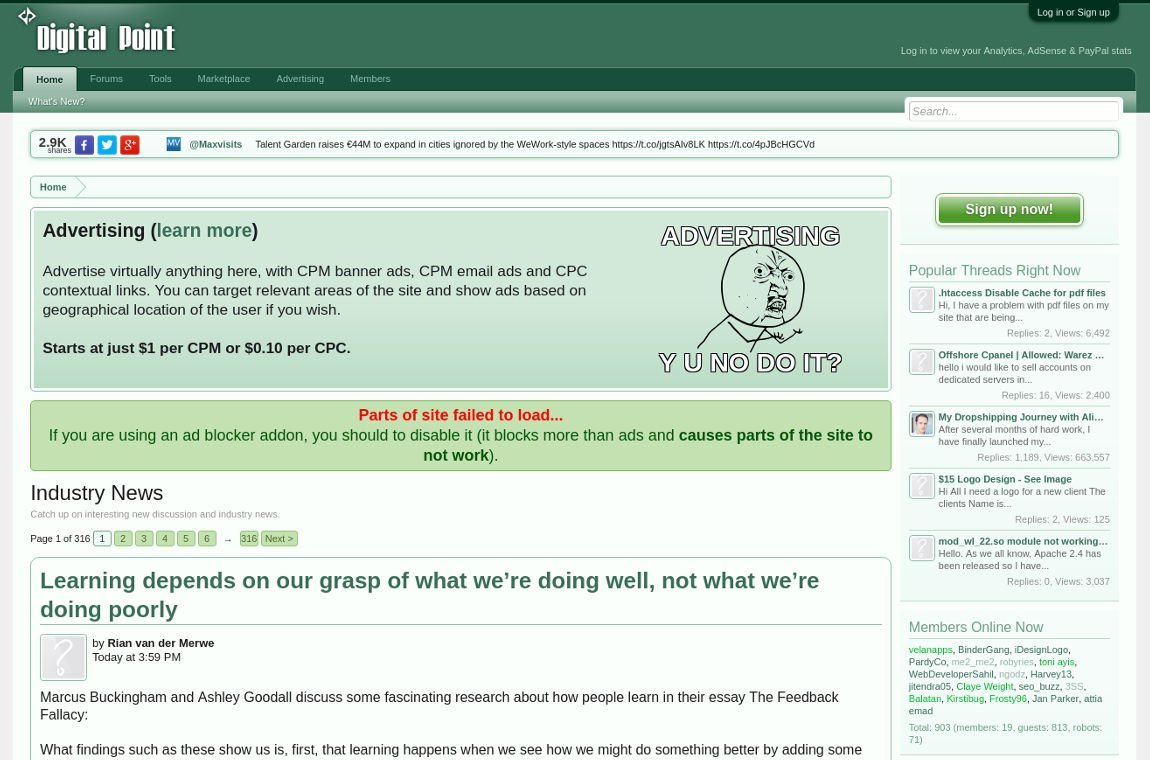APSense emerges as more than just a business-oriented social platform. It seamlessly blends Web 2.0 interactivity with robust networking tools, catering to both local startups and global enterprises. Whether it’s forming niche interest groups, curating quality business content, or building private, tailored networks, APSense offers an environment where business professionals can genuinely connect, collaborate, and thrive. Despite facing competition and minor hitches, its comprehensive toolkit and user-centric design make it a commendable choice for anyone seeking meaningful business networking.
24 Legitimate Ways to Make Money Online
Making money online is the dream of many people. There are courses, books, and articles available online to teach you – what you need to know to succeed, but still, 98% of people who try to make money online fail within a year. Why? That is because of laziness and misinformation about online business and making money online.
This article is going to break it down when it comes to making money online as a creator, freelancer, or professional.
There is no magical way to make money online. If you are going to work from home as a business owner or professional, you have to also learn – how to market your business in various ways and beat the competition. Without knowledge of sales and marketing, you are not going to succeed, no matter how many times you try.
There are primarily three ways to make money online: Work, Create or Promote. There is no shortcut for making money online, you need to have experience, patience, and courage to do the work you need to do.
Work
When you exchange your expertise and time for money, then It is called a job. The same goes for an internet-based job. But there are significant differences between a 9 to 5 regular job and an internet-based job. In a regular job, you have to go to the office every day, obey the office rules, and you will have less freedom in your work life.
On the other hand, an Internet-based job has more freedom and abilities to make more money, but the downside is you won’t get financial incentive that comes with a regular job, like insurance, paid vacation etc. Here is a list of gig works you can do to make money online.
1. Freelancing
Freelancing is one of the easiest ways to make money online. You can start making money from today. The only thing you need is the expertise in any filed which has demand in the freelance marketplace and time. You can work as a freelancer through a freelance website like Upwork, Freelance.com and Fiverr – and also you can offer your service directly to your clients.
When you are just starting out, then working on a freelance website is the fastest way to succeed. Once you have a following or client base of your own outside the freelance website. Then, start an agency or service website to server your clients directly. You can also build a client base using content marketing or pitching your service to your prospect directly. LinkedIn is the best social media platform for finding B2B clients.
2. Remote Job
Nowadays, many companies are offering their employees flexible remote jobs. It is because working remotely through the internet is easier than renting an office, and it is also a better way of running a business in terms of productivity. So, it is win-win for employer and employees both. You have to have high-paying skills. You can move to a country with a low cost of living and become a digital nomad.
There are many types of remote jobs like an hourly, contract based, project-based etc. It depends on the employer.
3. Virtual Assistant
Many professionals and business owners are turning to a virtual assistant to get things done faster and be more productive. You can find a virtual assistant job through the freelance website or work with a middle man agency like Zirtual.
As a virtual assistant, you don’t have to jump from one project to another as Freelancer do. And, you also don’t have to compete with other virtual assistants. It is the best way to make money online. It doesn’t pay much, but you can live conformably on your virtual assistance income, especially if you live in a developing country.

4. Selling Expert Advice
If you have expertise and knowledge in a certain field, then you can sell your advice as a consultant. Of course, you have to brand yourself and market to attract clients. You can sell your advice as an expert on Clarity.fm or become a coach to offer your service on a platform like Coach.io.

5. Consulting Agency
Besides selling advice as an expert, you can also turn this expert advice into a long-term business. To do that – You have to position yourself as a business or agency who provides professional services.
You can hire other freelancers or employees to help you with your business. This is the great way to make money online eventually. It will take time to build a client base. At start, you have to do cold emailing, paid advertisement to get clients, later clients will come to you.
Create
You can make a real passive income by creating something and selling online. It could be any physical or digital product. I am not talking about service. I have already covered up about services in the work section.
Think of this way: instead of working on someone else’s business – invest your time and energy in creating a product which you can sell as your own. The best kinds of product or assets are which required you to create one-time and sale as long as you want.

6. Blogging
Blogging is an old and still relevant way to build your online audience and start making money online. Just like any other skill or knowledge, there are people in the world who are looking to learn something which you already know. And people who want to entertain them self with your content.
You don’t have to be an expert to write a blog post. Usually experts don’t write, they sell services. You just have to be one step ahead of your audience. This is it. Go ahead and start blogging now.

7. Creating Video
Marketer says content marketing is king in the information age. If it does, then video content is the best kind of content marketing. Video content is more engaging, earns people’s trust quickly, and drives more traffic than any other format of content.
Don’t be a shy person, if you do, then you will end up working for a regular job or freelancing. Video content is going to stay as long as the internet. Start creating tutorial videos, vlogging or entertainment, whichever way gets you or your business attention.

8. Creating Podcast
Radio is now replaced by Podcast. Today’s media company and brand are using the podcast as a communication channel. Advertisers are also jumping to podcast trend to promote their offering.
A podcast is just like Blog but instead of writing, you do audio recording. There are many benefits of having a podcast for your brand. You can connect with a large number of an audience using Podcast and monetize your effort using sponsorship or promote your other business.
9. Publishing Books
Amazon ebook publishing accounts for 80% of ebook publishing market share in the USA and it is growing faster. Selling Ebook online is the best way to start making money.
You can easily start selling an ebook from your website and on a marketplace like Amazon. You don’t need a literary agent or publisher to become a self-published author. Furthermore, you can also convert your ebook into print book such as paperback and hardcover using a print on demand service such as Amazon KDP or IngramSpark.

10. Selling Graphics and Stock Photos
Are you a graphics designer, painter, or illustrator? Using the Internet, you can connect with buyers and sell your art easily than ever before. There are graphic design marketplaces where you can list your assets and get paid as per download.

11. Membership website
If you are an instructor or someone who owns data or anything which has demand in the world of business? You can turn your idea into a membership website and charge your audience one-time fees or subscription fees.
A membership website can be anything like a paid online forum, course, paid directory access, listing website etc.

12. Online Forums
If you dream of having your own Facebook, I mean your own social media platform. Think of an Online forum is your own Reddit like website. It is the best way to build online communities and create content without creating content, I mean user-generated content. Just like Facebook doesn’t create content, their users do.
You can monetize your online forums by selling ads, affiliate marketing, selling your own product/services etc. The best part is, You own the platform and the audience content.

13. Create and Sell Mobile App
If you know a programming language like Android development or any other mobile app development programming language. This is for you. You can create an app and monetize through selling Ads or selling subscription service.
You don’t have to create the next WhatsApp to make money using mobile app development. Just start with creating a small tool which makes people’s life easier. Tools like Bar code scanner, Ebook reader, notepad, Audio player, etc.

14. SaaS Business
SaaS stands for “software as a service”. It is the most popular way of starting your own online business or say Startup. You get the idea which has demand in the marketplace, then hire developers to turn the idea into a software business. There are many examples of SaaS business think of social media management tools, productivity tools etc.
Promote
Now you have learned the way of making money through selling skills and creating something. Next is promoting someone else’s products or services. Well, before you start promoting, you need to find something to promote. If you already have your product/services, then this section is not for you, It is for those who don’t have their product.

15. Affiliate Marketing
Affiliate marketing is the most popular way of making money online. You don’t need any experience other than sales and marketing. As an affiliate marketer, you are going to act as a broker or sales guy. Sales and marketing is the only profession which doesn’t require you to have any qualification. I mean, anyone can start making money through affiliating marketing.

16. CPA Marketing
CPA stands for Cost per action. It is a form of marketing where a business owner or product creator pays their sales partner based on leads, download of software, or any other action. CPA marketing is very similar to affiliate marketing, but the marketer gets paid for a certain action instead of commission on a sale.

17. Selling Banner Ads
If you have a website or blog with a good amount of page view, then selling ad space on your website is the best way to make money online. You get paid when someone clicks on your ads and per thousand-page view.
There are online ads networks like Google AdSense and Buysellads.com that you can sign up for an account. Selling ads space is the best way to monetize a website.

18. Selling Solo Ads
If you have direct contact information for your audience like email address, phone number etc., then you can partner with the marketer to sell ad space in your newsletter or send promo email to your subscribers. This way, you can monetize your leads without selling your subscriber data.

19. Influencer Marketing
An influencer is a person who has access to a large amount of audience via an online platform like social media or offline like TV or Radio. Influencer marketing is popular nowadays because of the rise of social media. It is now easier than ever before to build an online audience and fan base. The most popular Influencer marketing platforms are YouTube, Facebook, Instagram, and TikTok.
If you have a fan base on any social media, then it is easy to monetize your audience through Influencer marketing. You can get your profile listed on various Influencer listing platforms like Influence.co to attract clients and get sponsors deal.

20. Dropshipping
Drop-shipping is also known as an arbitrage e-commerce business. When you sell products online which you don’t own, but you act as you do. I mean you collect the order from your customer then you use the data to order a product on someone else’s website or some else automatically fulfil your order.
This way, your customer pays you $$ but the product actually cost is $, you made $ in profit. You don’t touch the product because you are a middleman between a supplier and your customers.
Invest
When people talk about making money online, they usually talk about working and promoting. But there is a whole new level of making money online. It is called investing.
Investing is a great way to make money by taking risk. If you have money, then use it to buy and sell assets. Buy low and sell high. Did you get my point right?

21. Domaining
Domain name buying and selling is called domaining. It is also known as digital real estate. The process of buying and selling a domain name is simple. You buy a valuable domain name at low cost, then list your offer on domain name marketplace and wait for the offer to come in. Or reach to your potential buyers.
This is my favorite way to make money online. I have bought and sold domain names many times through Godaddy premium domain name listing. It is an easy way to make money online, but it requires you to have patience. You can always start with a low investment.

22. Buying and Selling Website
A website represents an online business, not just a presence. Flippa is a domain name, website, mobile app and any digital assets’ marketplace where you can list your offer for sales and run auctions.
You can make money buying a low-cost website with great value, then sell it through Flippa or any other marketplace. You can also build a website from scratch to sell on Flippa.

23. Forex Trading
There are a bunch of trading you can do online, from stock market trading to binary options trading. The Internet has also an open door for fraudulent, make sure you know what you are doing when it comes to trading online.
I have tried forex trading before and failed. Stock market investing is much safest compared to forex trading.

24. Cryptocurrency Investment
Cryptocurrency is a lucrative market, value of currency goes up and goes down quickly. If you have extra money and want to make money investing, that has high risk and high reword. Get your hand on cryptocurrency like Bitcoin etc.
I will not advise investing ICO, NFT and stupid cryptoshit because there are lot of scams in the crypto world. Make sure you stay alert and curious.
I hope I have made my point clear. Now go ahead, hustle and stop looking for secret ingredients of making money online.
When I started searching for a way to make money online – I was blown up for a certain time, that there is a secret which only my Bizz guru knows. I started freelancing and kept begging as a side hustle.
It was a long article. Thanks for reading to last, now go ahead and join my email list, this is where the real magic happens.
Recent Blog Posts
AIContentFly Review – Worth it? AI Writing Tools
AIContentFly is a potent content creation tool that offers a plethora of features and benefits. With its AI technology, affordability, and user-friendly interface, it is a game-changer for businesses and individuals aiming to enhance their content creation process and scale their revenue. If you’re in search of a cost-effective content creation solution, AIContentFly is certainly worth a look.
How to Make Money Selling Advice as an Expert
Don’t fret if your area of mastery isn’t widely recognized; there is someone out there who values what you know. Whether you are a professional, a hobbyist, or an expert, there’s room for you to turn your knowledge into cash. The Knowledge Commerce industry, set to grow to an astounding $325 billion by 2025, provides an accessible avenue to generate passive income, foster a devoted following, and most importantly, share what you know best.






